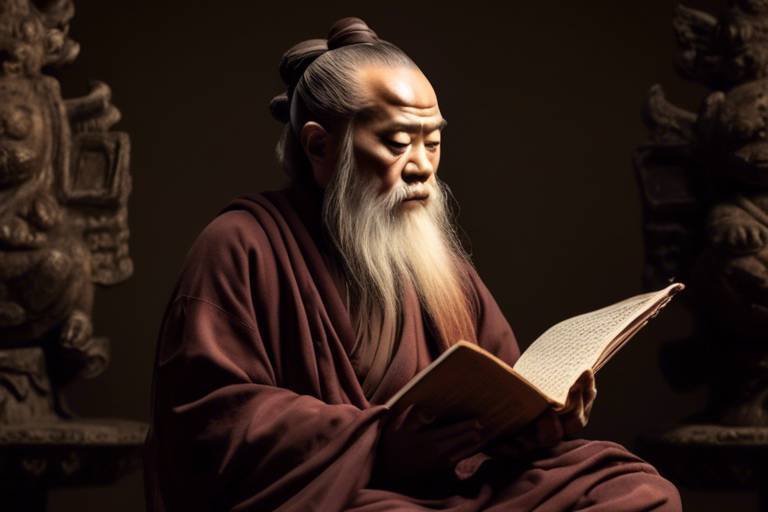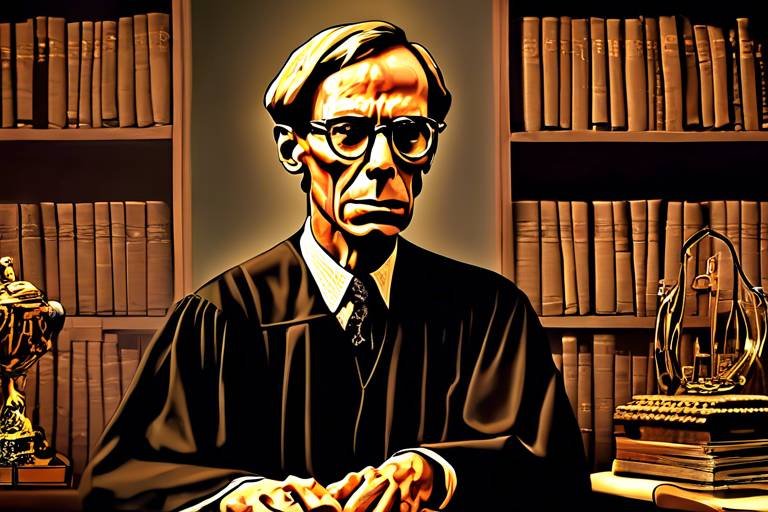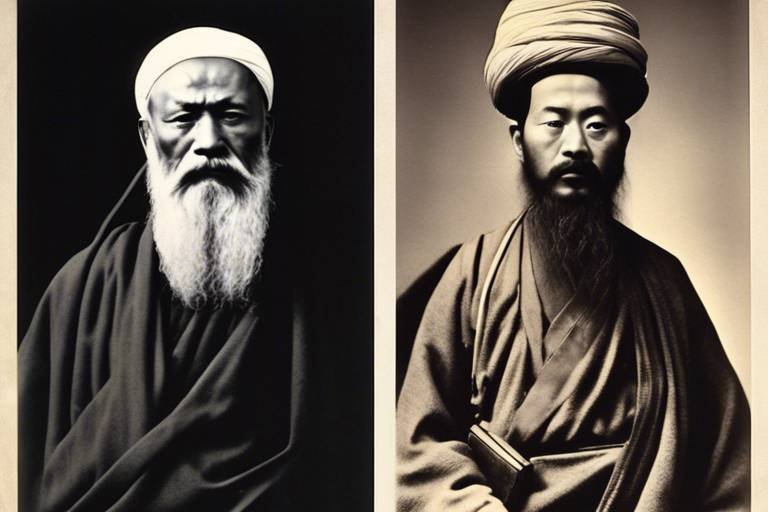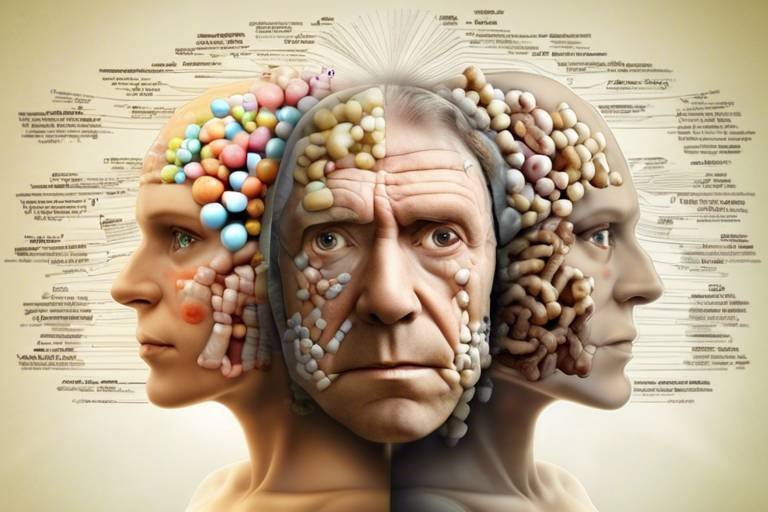The Philosophy of 'Nothing'
The concept of nothing is one of the most perplexing and intriguing ideas in philosophy. It challenges our understanding of existence, reality, and the very fabric of being. When we think of nothing, we often envision a void, a blank space devoid of matter or meaning. Yet, this seemingly simple idea has profound implications that resonate through various philosophical traditions, from ancient to modern times. So, what does it really mean to contemplate nothingness? Is it merely the absence of something, or does it hold a deeper significance that can unlock the mysteries of our existence?
Philosophers have long grappled with the implications of nothingness. For instance, when we ask, "What is nothing?" we are not just posing a semantic question; we are delving into the heart of metaphysical inquiry. In a world that constantly strives for meaning and substance, the notion of nothing can feel unsettling. Yet, it is this very discomfort that drives philosophical exploration. Nothingness invites us to question our assumptions about being and existence, prompting us to explore the boundaries of human thought.
Throughout history, thinkers have approached the idea of nothingness from different angles. Some have viewed it as a state to be feared, while others embrace it as a pathway to enlightenment. The tension between these perspectives creates a rich tapestry of thought, where nothingness is both a void and a source of potential. This duality reflects the complexity of human experience, where the absence of something can lead to the discovery of new insights and understandings.
As we navigate through the various interpretations of nothingness, it becomes clear that this concept is not just an abstract idea; it has real-world implications that touch on ethics, existence, and the very nature of reality. In modern thought, the exploration of nothingness continues to inspire debate and inquiry, influencing fields such as metaphysics, existentialism, and even psychology. Thus, understanding nothingness is not merely an academic exercise—it is a journey into the depths of our own consciousness and the universe itself.
- What is the philosophical significance of nothing?
Nothingness challenges our understanding of existence and invites us to explore the boundaries of reality. - How do Eastern philosophies view nothingness?
Eastern philosophies, particularly Buddhism and Taoism, see nothingness as a pathway to enlightenment and a fundamental aspect of the universe. - What role does nothingness play in existentialism?
Existentialist philosophers like Sartre and Heidegger explore nothingness as integral to human freedom and the search for meaning. - Is nothingness just the absence of something?
While it may seem like a void, nothingness holds deeper significance and can lead to profound insights.

The Nature of Nothingness
Understanding the essence of nothingness is crucial for grasping its philosophical implications. At first glance, the term may seem paradoxical—how can we even talk about nothing? Yet, this is where the intrigue begins. Philosophers have long debated the nature of nothingness, seeking to unravel its mysteries and implications for existence itself. To put it simply, nothingness is not merely an absence; it is a concept that challenges our understanding of reality, existence, and the universe.
Different thinkers have approached nothingness from various angles, each contributing to a richer understanding of what it means. For instance, the ancient Greek philosopher Parmenides famously argued that nothingness is impossible because to speak of nothing is to give it a form of existence. In contrast, Plato viewed nothingness as a mere lack of being, a shadow of the true forms that make up reality. This divergence in thought illustrates how complex the concept is, as it intertwines with our perceptions of reality and existence.
Moreover, the implications of nothingness extend beyond mere philosophical debate. In the realms of physics and cosmology, the concept of nothingness poses its own set of questions. For example, what was there before the Big Bang? Was there truly “nothing,” or was there something that we cannot yet comprehend? This intersection of philosophy and science further complicates our understanding of nothingness, challenging us to think deeply about existence and the universe.
To make sense of the various interpretations of nothingness, we can categorize them into a few key perspectives:
- Metaphysical Nothingness: This perspective focuses on the absence of being and the implications of such absence in understanding existence.
- Existential Nothingness: Here, the emphasis is on the human experience of nothingness, particularly in the context of despair and freedom.
- Scientific Nothingness: This approach examines the concept in light of modern physics, questioning the nature of the universe before its existence.
Each of these perspectives offers a unique lens through which to view nothingness, illustrating that it is not a simple concept but a profound inquiry into the nature of reality itself. As we delve deeper into this philosophical exploration, we begin to see that nothingness is not just an absence; it is a critical element that shapes our understanding of existence, meaning, and the universe. The quest to understand nothingness might just lead us to the very essence of what it means to be.

Historical Perspectives
The concept of 'nothing' has been a profound subject of inquiry throughout the ages, captivating the minds of philosophers across different cultures and eras. From the ancients to modern thinkers, the interpretations of nothingness have evolved, yet its significance remains a cornerstone in philosophical discourse. The journey into the understanding of nothingness begins with the ancient Greeks, who grappled with the idea of the void and the implications of absence. Thinkers like Parmenides and Democritus laid the groundwork by questioning the nature of reality itself. Parmenides famously argued that "what is, is," suggesting that nothingness could not exist, as it contradicts the very notion of being.
In contrast, Democritus introduced the concept of the atom, proposing that everything is composed of indivisible particles, which implies that nothingness exists between these particles. This dichotomy between being and non-being set the stage for centuries of philosophical exploration. The Middle Ages saw a shift in perspective, particularly with the rise of religious thought. Philosophers like Aquinas integrated the idea of nothingness into the context of divine creation, suggesting that God created the universe from nothing, a concept known as creatio ex nihilo.
As we move into the Renaissance and Enlightenment periods, the discourse around nothingness continued to evolve. Thinkers such as Descartes and Hume began to question the nature of existence and perception, leading to a more empirical approach to understanding reality. Descartes' famous dictum, "I think, therefore I am," implicitly acknowledges the existence of thought as a counter to nothingness, while Hume's skepticism about the self challenges the notion of a permanent being in a world where nothing is certain.
In the 19th century, the existentialists began to take center stage, further complicating the discussion around nothingness. Figures like Kierkegaard and later Sartre and Heidegger explored how nothingness relates to the human condition, freedom, and existence itself. They posited that confronting nothingness is essential for understanding our place in the universe. This existential approach marked a significant departure from previous philosophical inquiries, focusing on individual experience and the anxiety that accompanies the realization of nothingness.
To summarize the historical perspectives on nothingness, here’s a brief table highlighting key figures and their contributions:
| Philosopher | Era | Key Contribution |
|---|---|---|
| Parmenides | Ancient Greece | Argued that nothingness cannot exist |
| Democritus | Ancient Greece | Introduced the concept of atoms and the void |
| Aquinas | Middle Ages | Proposed creation from nothing (creatio ex nihilo) |
| Descartes | Renaissance | Emphasized thought as a counter to nothingness |
| Sartre | 20th Century | Connected nothingness to human freedom and existence |
As we can see, the historical perspectives on nothingness are rich and varied, each contributing to our current understanding of this elusive concept. The exploration of nothingness has not only shaped philosophical thought but also influenced art, science, and psychology. It invites us to ponder the depths of existence and the reality of our experiences, prompting us to ask: What does it truly mean to exist in a world where nothingness looms?
- What is the philosophical significance of nothingness? Nothingness challenges our understanding of existence, reality, and the nature of being.
- How do Eastern philosophies view nothingness? Eastern philosophies often embrace the concept of emptiness, seeing it as a path to enlightenment and understanding of the universe.
- What role does nothingness play in existentialism? Existentialists view nothingness as integral to human freedom and the search for meaning in an otherwise indifferent universe.
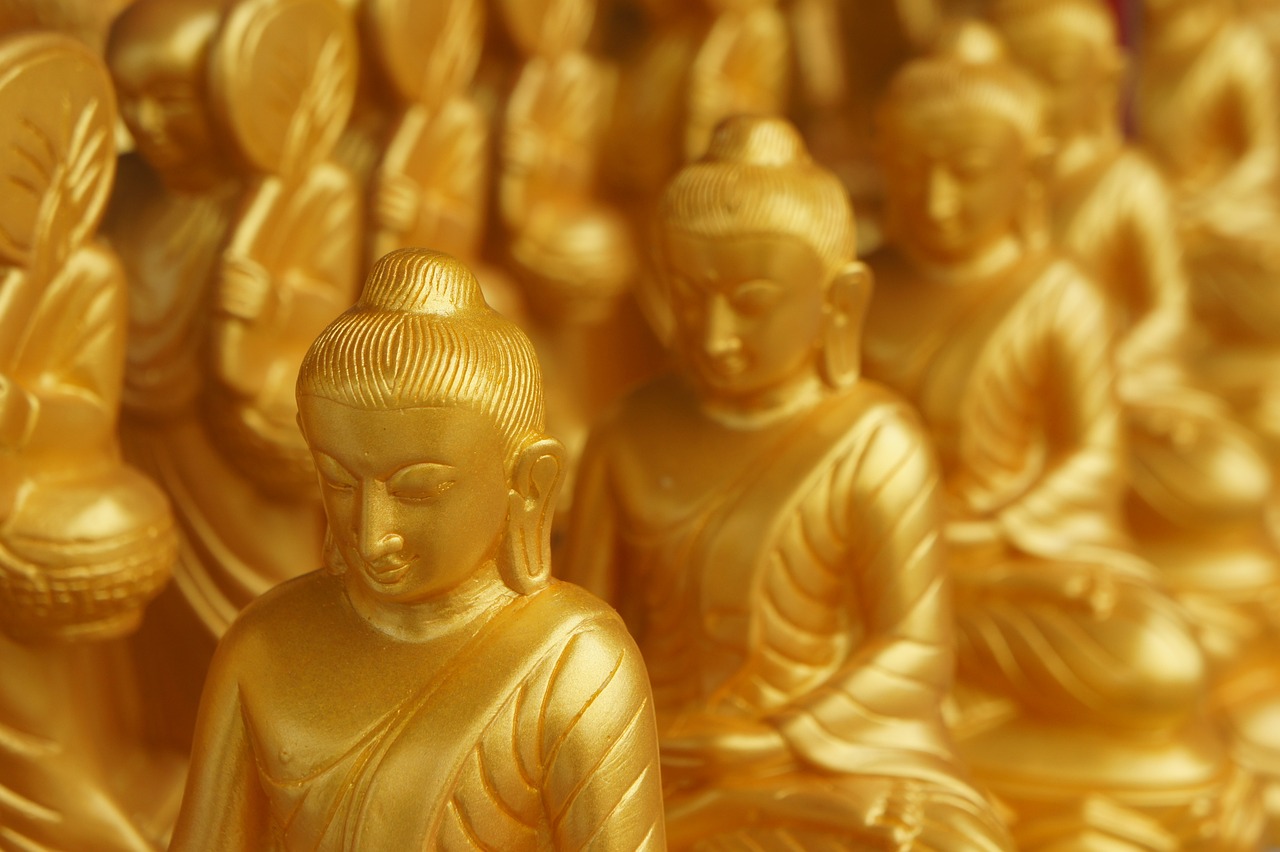
Eastern Philosophical Views
When we dive into the rich tapestry of Eastern philosophies, we encounter a profound and nuanced understanding of nothingness. Unlike the Western tradition, which often views nothingness as a void or absence, Eastern philosophies—especially Buddhism and Taoism—offer a more intricate perspective that intertwines nothingness with the fabric of existence itself. In these traditions, nothingness is not merely a lack of being; instead, it is an essential aspect of reality that reveals the interconnectedness of all things.
In Buddhism, the concept of emptiness (or śūnyatā) plays a pivotal role. This idea suggests that all phenomena are devoid of inherent existence. To put it simply, nothingness is perceived as the absence of a permanent self or essence in all things. This realization is not just a philosophical abstraction; it is a transformative experience that leads to liberation from suffering. When one understands that attachments and desires are rooted in the illusion of permanence, they can begin to experience life with greater clarity and freedom.
Zen Buddhism takes this understanding a step further. Here, the notion of emptiness is not just a concept to be understood intellectually but a state to be experienced. Through practices such as meditation, Zen practitioners aim to directly encounter the emptiness of their own minds. This journey into nothingness is often described as a path to enlightenment, where the barriers of ego dissolve, revealing a profound sense of unity with the universe. In this light, nothingness becomes a gateway to deeper spiritual insights, allowing individuals to transcend the limitations imposed by their thoughts and beliefs.
Taoism also offers a unique perspective on nothingness, viewing it as a fundamental aspect of the universe. The famous Tao Te Ching, attributed to Laozi, emphasizes the importance of wu wei, or effortless action, which embodies the idea of aligning oneself with the natural flow of the universe. In Taoist thought, nothingness is not something to be feared or avoided; rather, it is embraced as the source of all potential. The Tao, often described as the ultimate reality, is characterized by its formlessness and emptiness, suggesting that true wisdom lies in recognizing the value of nothingness as a space from which all things arise.
In summary, Eastern philosophies present a rich and multifaceted understanding of nothingness. Whether through the lens of Buddhism's emptiness or Taoism's embrace of the void, these traditions encourage us to reconsider our relationship with nothingness. Instead of viewing it as a mere absence, they invite us to see it as a vital component of existence that fosters connection, liberation, and profound spiritual awakening.
- What is the significance of nothingness in Eastern philosophies? Nothingness is viewed as a fundamental aspect of reality that reveals the interconnectedness of all things, rather than merely an absence of being.
- How does Zen Buddhism approach the concept of emptiness? Zen Buddhism emphasizes experiencing emptiness through meditation, leading to enlightenment and the dissolution of ego barriers.
- What role does nothingness play in Taoism? In Taoism, nothingness is embraced as the source of all potential, encouraging alignment with the natural flow of the universe.

Zen Buddhism's Emptiness
Zen Buddhism presents a fascinating perspective on the concept of emptiness, which is often misunderstood as mere nothingness. Instead, it invites practitioners to delve deeper into the nature of reality, encouraging an exploration of the interconnectedness of all things. In Zen, emptiness is not a void to be feared; it is a profound state of being that reveals the true essence of existence. This realization can lead to a transformative experience, where one begins to see beyond the superficial layers of life.
At its core, Zen teaches that emptiness is the absence of inherent existence. It suggests that all phenomena are transient and lack a permanent, unchanging essence. This idea can be likened to a cloud—though it appears solid and defined, it is merely a collection of water vapor that can change shape and dissolve at any moment. Understanding this fluidity of existence allows Zen practitioners to cultivate a sense of detachment from the material world, leading to greater peace and clarity.
One of the most profound teachings in Zen Buddhism is the notion of “no-self” (anatta). This principle asserts that the self is an illusion, a construct that binds us to suffering. By recognizing that our thoughts, emotions, and even our identities are not fixed, we can begin to embrace the emptiness within us. This doesn’t mean we lose our individuality; rather, we gain a deeper understanding of our place in the universe. The process of letting go of the ego can be likened to shedding a heavy coat—once it’s off, we feel lighter, freer, and more connected to the world around us.
Engaging with the concept of emptiness in Zen practice often involves meditation. During meditation, practitioners are encouraged to observe their thoughts and feelings without attachment, allowing them to arise and dissipate like waves on the ocean. This practice cultivates a state of mindfulness and awareness, helping individuals to realize that their thoughts do not define them. In this space of emptiness, one can encounter profound insights and a deeper connection to the present moment.
Furthermore, Zen teaches that embracing emptiness can lead to a sense of freedom and liberation. By releasing the burdens of expectations and desires, one can experience life more fully. The teachings of Zen are often encapsulated in the phrase “form is emptiness, emptiness is form,” which highlights the idea that while we live in a world of forms and distinctions, at the fundamental level, everything is interconnected and transient. This duality encourages a balanced perspective, where one can appreciate the beauty of existence while recognizing its ephemeral nature.
In summary, Zen Buddhism's approach to emptiness is not about nihilism or despair; rather, it is a pathway to enlightenment. By understanding and embracing emptiness, practitioners can unlock profound spiritual insights and cultivate a deeper sense of peace. The journey into emptiness is ultimately a journey into the heart of existence itself, revealing the intricate web of life and the beauty that lies within.
- What is the significance of emptiness in Zen Buddhism? Emptiness is central to Zen teachings, emphasizing the transient nature of existence and the interconnectedness of all things.
- How does meditation relate to the concept of emptiness? Meditation helps practitioners observe their thoughts without attachment, fostering a deeper understanding of emptiness and the no-self concept.
- Can embracing emptiness lead to a better life? Yes, by letting go of attachments and expectations, individuals often find greater peace and a more profound connection to the present moment.

Taoist Perspectives on Nothing
Taoism, an ancient Chinese philosophy, offers a fascinating lens through which to view the concept of nothingness. In Taoist thought, the notion of nothing is not merely a void or absence; rather, it is seen as a fundamental aspect of the universe that is intricately connected to the idea of non-being. This perspective suggests that nothingness is not something to be feared or avoided, but rather embraced as an essential part of existence. In fact, the Tao Te Ching, a foundational text of Taoism, often emphasizes the importance of wu wei, or effortless action, which aligns with the idea of aligning oneself with the natural flow of the universe, including its empty spaces.
To delve deeper into this, Taoism teaches that everything arises from nothing. Just as a potter shapes clay into a vessel, it is the empty space within the pot that gives it purpose. This metaphor illustrates how nothingness serves as a canvas upon which existence is painted. Without this emptiness, the vessel would lack function, just as life would lack meaning without the contrast of nothingness. Thus, in Taoist philosophy, nothingness is not a negation but a vital force that allows for the manifestation of all things.
Moreover, the Taoist view of nothingness encourages a sense of harmony with the universe. By recognizing the cyclical nature of existence—creation, preservation, and dissolution—Taoism invites individuals to experience the world with a sense of wonder and acceptance. This perspective can be particularly liberating; it allows one to let go of the constant striving for material success and instead focus on the beauty of the present moment. In this way, nothingness becomes a source of peace and tranquility, reminding us that sometimes, less truly is more.
In conclusion, Taoist perspectives on nothingness encourage us to rethink our relationship with emptiness. Rather than viewing it as a lack, we can see it as a space rich with potential and possibility. By embracing the concept of nothing, we can cultivate a deeper understanding of ourselves and our place in the universe. After all, in the grand tapestry of existence, it is often the empty spaces that make the most profound impact.
- What is the Taoist view of nothingness?
Taoism sees nothingness as a fundamental aspect of the universe, emphasizing that it is not a void but a source of potential and existence. - How does nothingness relate to the concept of wu wei?
Wu wei, or effortless action, aligns with the idea of nothingness by encouraging individuals to flow with the natural order of the universe, rather than resisting it. - Can embracing nothingness lead to personal growth?
Yes! Embracing nothingness can provide a sense of peace and acceptance, allowing individuals to focus on the present moment and cultivate a deeper understanding of themselves.
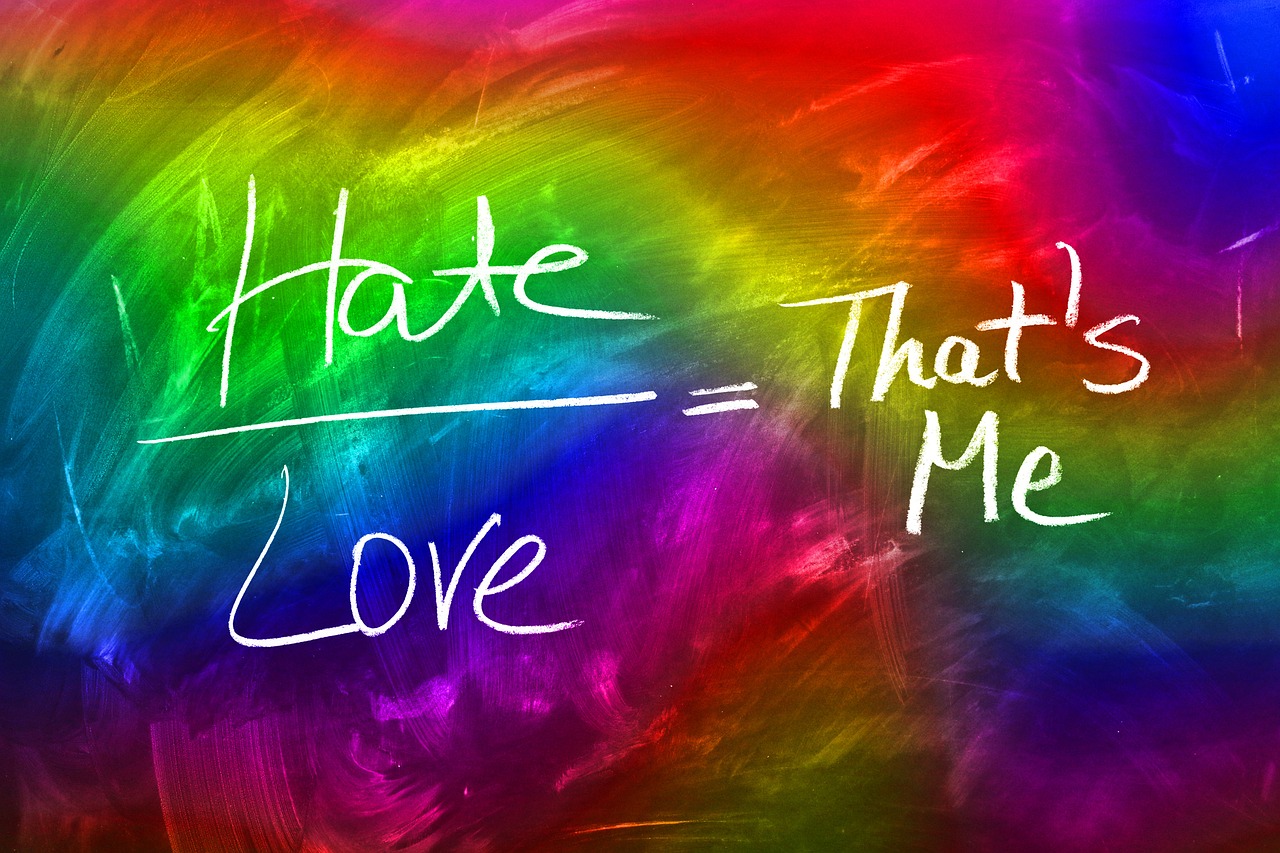
Western Philosophical Views
Western philosophy has a rich and intricate relationship with the concept of nothingness. From the ancient Greeks to modern thinkers, the idea of 'nothing' has been a point of contention, curiosity, and exploration. Philosophers like Parmenides and Plato laid the groundwork by questioning the very nature of existence. Parmenides famously argued that 'nothing' cannot be thought or spoken of, suggesting that all that exists is a singular, unchanging reality. This assertion raises a profound question: if nothing can be conceived, how can it hold any meaning? Plato, on the other hand, approached nothingness through his theory of forms, positing that the material world is but a shadow of a higher reality. In his view, the existence of forms implies that there is a realm of perfection that contrasts sharply with the flawed, transient nature of our world.
Fast forward to the Enlightenment and the rise of rationalism, where thinkers like René Descartes began to grapple with the implications of nothingness in relation to existence itself. Descartes' famous dictum, "Cogito, ergo sum" (I think, therefore I am), underscores the idea that the act of thinking is proof of existence. Yet, this raises another tantalizing question: what about the moments of doubt or uncertainty? In those instances, could one argue that nothingness looms large? Descartes' exploration of doubt leads to a deeper understanding of existence, suggesting that acknowledging nothingness is essential for affirming being.
As we delve deeper into the 19th and 20th centuries, existentialist philosophers like Friedrich Nietzsche and Martin Heidegger take center stage. Nietzsche provocatively declared that "God is dead," encapsulating a world where traditional values and meanings have crumbled, leaving behind a void. For Nietzsche, this nothingness is both a challenge and an opportunity for humanity to redefine its own purpose. Meanwhile, Heidegger's exploration of being highlights the interplay between existence and nothingness. He argued that confronting nothingness is crucial for understanding our own being, suggesting that the awareness of our mortality and the void can lead to a more authentic existence.
In summary, the Western philosophical discourse on nothingness is a tapestry woven with diverse threads of thought. From the ancient Greeks to existentialists, the exploration of nothingness not only challenges our understanding of existence but also invites us to reflect on our own lives. The implications of nothingness extend beyond mere philosophy; they resonate in our daily experiences and our quest for meaning in a seemingly indifferent universe.

Existentialism and Nothingness
Existentialism, a philosophical movement that flourished in the 20th century, places a profound emphasis on individual existence, freedom, and the inherent meaning—or lack thereof—of life. At the heart of this philosophy lies the concept of nothingness, which is not merely an absence but a crucial element that shapes human experience and consciousness. Think about it: when we confront the void, we are forced to grapple with our own existence. This confrontation can be unsettling, akin to standing on the edge of a cliff, peering into the abyss below. It’s in this space of nothingness that existentialists find both challenge and opportunity.
Two of the most prominent existentialist thinkers, Jean-Paul Sartre and Martin Heidegger, have offered rich insights into the relationship between nothingness and human freedom. Sartre famously declared, "Existence precedes essence," suggesting that we are not born with a predetermined purpose; instead, we create our own essence through choices and actions. This idea is closely tied to his view of nothingness. For Sartre, nothingness is what allows for freedom; it is the empty space that enables us to choose, to act, and to define ourselves. Without this nothingness, we would be mere puppets of fate, devoid of agency.
Heidegger, on the other hand, approaches nothingness from a slightly different angle. His work often explores the concept of Being and its relationship to nothingness, emphasizing that our understanding of existence is deeply intertwined with the awareness of our own mortality. Heidegger posits that when we confront the idea of our own non-being, we can appreciate the significance of our being. This realization can be both liberating and terrifying; it compels us to live authentically, to embrace our freedom, and to make meaningful choices in the face of an indifferent universe.
So, how do we navigate this complex interplay between existence and nothingness? Existentialist thought encourages us to embrace the uncertainty of life. Here are a few key takeaways:
- Freedom is Found in Choice: The recognition of nothingness empowers us to make choices that define our lives.
- Authenticity Matters: In a world that often feels chaotic, living authentically means acknowledging our freedom and the weight of our decisions.
- Embrace the Void: Rather than fearing nothingness, we can see it as a canvas on which we paint our lives.
In conclusion, the existentialist view of nothingness is not just a philosophical abstraction; it is a vital aspect of the human experience. By recognizing and engaging with nothingness, we can unlock new dimensions of freedom and authenticity. It invites us to ponder our existence, to confront our fears, and ultimately, to create meaning in a world that often appears devoid of it.
- What is the main idea of existentialism?
Existentialism focuses on individual freedom, choice, and the search for meaning in a seemingly indifferent universe. - How does nothingness relate to freedom?
Nothingness allows individuals to make choices and define their own essence, creating a space for freedom. - Who are the key figures in existentialism?
Prominent existentialist philosophers include Jean-Paul Sartre, Martin Heidegger, and Simone de Beauvoir. - Can nothingness be a positive concept?
Yes, nothingness can be seen as a liberating force that encourages authentic living and personal agency.

Sartre's Nothingness
Jean-Paul Sartre, a towering figure in existentialist philosophy, presents a compelling interpretation of nothingness that fundamentally shapes his understanding of human freedom and existence. For Sartre, nothingness is not merely an absence or void; rather, it is a crucial element of being itself. He famously states that "existence precedes essence," which implies that individuals are not born with a predetermined nature but instead create their own essence through actions and choices. This notion introduces the idea that nothingness allows for freedom, as it opens up a space where individuals can define themselves beyond societal expectations and inherent traits.
To grasp Sartre's perspective, we must consider the relationship between being and nothingness. He posits that being, or 'being-in-itself,' is characterized by a solid, unchanging existence, while 'being-for-itself'—the realm of human consciousness—exists in a state of constant flux and potentiality. It is this 'for-itself' that recognizes nothingness, leading to the realization that one can choose to be something different from what they currently are. In this way, nothingness serves as a liberating force, enabling individuals to transcend their circumstances and embrace a life of authenticity.
However, Sartre also acknowledges the weight of this freedom. The recognition of nothingness can lead to feelings of anxiety and despair, as individuals confront the burden of creating meaning in a world devoid of inherent purpose. This existential angst arises from the confrontation with the void—an encounter with nothingness that forces one to grapple with the reality of their existence. Sartre's philosophy thus presents a paradox: while nothingness opens the door to freedom, it also confronts individuals with the responsibility of defining their own lives in an indifferent universe.
In summary, Sartre's exploration of nothingness is pivotal in understanding his existentialist framework. It illustrates how the absence of predetermined essence allows for personal freedom, while simultaneously highlighting the existential challenges that accompany such freedom. By embracing nothingness, individuals are empowered to create their own identity and meaning, even as they navigate the complexities of existence.
- What does Sartre mean by "existence precedes essence"?
This phrase encapsulates the idea that individuals are not born with a fixed nature but instead create their essence through choices and actions. - How does nothingness relate to human freedom in Sartre's philosophy?
Nothingness is essential for human freedom as it allows individuals to transcend their given circumstances and define themselves independently. - What is the significance of anxiety in Sartre's view of nothingness?
Anxiety arises from the recognition of nothingness and the responsibility of creating meaning in a world without inherent purpose.

Heidegger's Being and Nothingness
Martin Heidegger, one of the most profound philosophers of the 20th century, delves deeply into the relationship between being and nothingness, challenging us to reconsider our understanding of existence itself. His seminal work, Being and Time, introduces a radical perspective that suggests nothingness is not merely the absence of something but a fundamental aspect of being itself. Heidegger argues that to understand being, we must first confront the void—this concept of nothingness that underlies all existence.
At the heart of Heidegger's philosophy is the idea that human beings are "thrown" into a world that is inherently meaningful yet filled with uncertainty. This existential predicament leads us to grapple with the notion of nothingness. In his view, nothingness is what allows us to question our existence and seek meaning beyond the mundane. It's akin to standing on the edge of a vast abyss, where the depths of nothingness invite us to explore the very nature of our being. This exploration is not just an intellectual exercise; it is a deeply personal journey that reflects our fears, hopes, and the quest for authenticity.
Heidegger posits that our awareness of nothingness is what makes us uniquely human. Unlike other beings, we have the capacity to reflect on our existence, to ponder our mortality, and to confront the void that lies before us. This confrontation with nothingness can be daunting, but it also opens the door to profound insights about life, existence, and our place in the universe. To illustrate this, consider the following key points:
- Being as a Question: Heidegger emphasizes that the question of being is central to philosophy. By recognizing the interplay between being and nothingness, we can begin to understand the essence of existence.
- The Role of Time: For Heidegger, time is intricately linked to our understanding of being. Our past, present, and future are shaped by our encounters with nothingness, influencing how we perceive our lives.
- Authenticity and Freedom: Engaging with nothingness allows individuals to live authentically. By acknowledging the void, we are liberated to create our own meaning and purpose, rather than relying on societal norms.
Moreover, Heidegger's exploration of nothingness extends to the concept of Being-toward-death. He argues that the awareness of our mortality is essential for grasping the significance of our existence. This awareness compels us to confront the nothingness that awaits us, ultimately leading to a more authentic way of living. In this sense, nothingness becomes a catalyst for personal transformation, urging us to embrace our freedom and responsibility in crafting our own lives.
In summary, Heidegger's examination of being and nothingness invites us to engage in a profound inquiry into the nature of existence. It challenges us to embrace the void, not as something to be feared, but as an opportunity for growth and understanding. By grappling with the complexities of nothingness, we can uncover deeper truths about ourselves and the world around us—a journey that is as enlightening as it is essential.

The Role of Nothing in Modern Thought
In contemporary philosophy, the concept of nothing has emerged as a pivotal topic, inspiring a plethora of debates and inquiries across various disciplines. Thinkers today grapple with the implications of nothingness not just in metaphysics, but also in ethics, science, and even art. The exploration of nothingness serves as a lens through which we can examine our existence, our values, and the very fabric of reality itself. But why does nothing hold such a significant place in modern thought?
One of the primary reasons is that nothingness challenges our understanding of being. In a world that often prioritizes existence and tangible realities, the idea of nothing can be both unsettling and liberating. It prompts us to question the essence of our experiences and the meaning we assign to them. For instance, if we consider the universe before the Big Bang—a state of nothingness—what does that imply about the origins of existence? This line of inquiry leads us to a deeper philosophical exploration of potentiality and reality.
Moreover, nothingness has significant implications in ethics. Modern philosophers often discuss the moral weight of actions in a world that acknowledges the void. Existentialists like Sartre and Heidegger have paved the way for this discourse, suggesting that the absence of inherent meaning in life can lead individuals to create their own values. This perspective can be empowering, as it places the responsibility of meaning-making squarely on our shoulders. Yet, it also raises profound questions: If nothing is predetermined, how do we navigate moral dilemmas? What guides our decisions when faced with the void?
In addition, the concept of nothingness has permeated scientific discussions, particularly in physics. Theories about the universe's origins and the nature of black holes often flirt with the idea of nothing. Physicists ponder whether nothing can truly exist, or if it is merely a state of potentiality waiting to be filled. This intersection of philosophy and science illustrates how the role of nothing extends beyond the abstract and into the realm of empirical inquiry.
To further illustrate the significance of nothing in modern thought, consider the following table that outlines key areas where nothingness is explored:
| Field | Key Questions |
|---|---|
| Metaphysics | What is the nature of existence and non-existence? |
| Ethics | How do we create meaning and values in a meaningless universe? |
| Physics | What does nothingness imply about the origins of the universe? |
| Art | How can emptiness and absence convey meaning in creative expression? |
As we delve deeper into these discussions, it becomes evident that nothingness is not merely an absence; it is a rich field of inquiry that challenges our assumptions and invites us to rethink our understanding of reality. Whether in philosophy, science, or art, the role of nothing continues to inspire and provoke thought, leading us to consider the vast implications of what it means to exist in a universe that is, at its core, as much about emptiness as it is about being.
- What is the philosophical significance of nothingness? Nothingness challenges our understanding of existence and prompts us to question the meaning we assign to our experiences.
- How does nothingness relate to ethics? It suggests that in a world devoid of inherent meaning, individuals are responsible for creating their own values.
- Can nothingness exist in a scientific context? Yes, theories in physics often explore the implications of nothingness, especially regarding the origins of the universe.
Frequently Asked Questions
- What is the philosophical definition of 'nothing'?
The philosophical definition of 'nothing' varies across different schools of thought. Generally, it refers to the absence of anything—no objects, no concepts, and no existence. It challenges our understanding of reality and prompts deep inquiries into existence itself.
- How do Eastern philosophies view nothingness?
Eastern philosophies, particularly Buddhism and Taoism, perceive nothingness as a vital aspect of existence. In Buddhism, nothingness is often associated with the concept of emptiness, which leads to enlightenment. Taoism embraces nothingness as a fundamental part of the universe, emphasizing harmony with the void.
- What is the significance of nothingness in existentialism?
In existentialism, particularly in the works of philosophers like Sartre and Heidegger, nothingness plays a crucial role in understanding human freedom and existence. Sartre argues that nothingness allows for personal choice and authenticity, while Heidegger explores how it relates to being and the human experience of the void.
- Can nothingness be considered a positive concept?
Yes, nothingness can be viewed positively, especially in philosophical contexts. It can represent potential, freedom, and the space for new beginnings. By embracing nothingness, one may find clarity and a deeper understanding of existence.
- How does modern philosophy engage with the concept of nothingness?
Modern philosophy continues to explore nothingness through various lenses, including metaphysics, ethics, and existential inquiry. Thinkers today debate its implications for understanding reality, consciousness, and the human condition, making it a vibrant topic in contemporary philosophical discourse.




